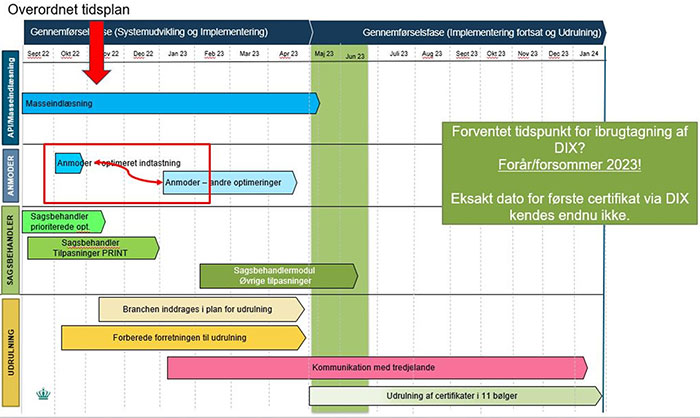DIX – Danish Veterinary and Food Administration digitizes food certificates

Morten Jensen Øllgaard
Cofounder & CEO
What is DIX?
The Danish Veterinary and Health Administration (FVST) is working to digitize the process around issuance of export certificates, as part of Denmark’s overall export strategy. This makes it easier for Danish exporters to sell products on the export markets.
The aim is to eliminate the heavy administrative work of many manual and time-consuming handling processes, for both the Danish Veterinary and Health Administration and the business world, and therefore the DIX project has been set up, which is FVST’s new IT system.
DIX (abbreviation for Digital Export Certificates) will mean both new requirements and new processes for the health exporting companies, but it will also provide new opportunities when the entire area will be digitized in the future.
What does DIX support?
According to FVST, DIX supports the following:
- Denmark’s digital growth through digitization of applications, case processing and delivery of export certificates
- Improvement and uniformity of the Danish Health and Veterinary Administration’s processing of requests for certification
- Integration of the Danish Veterinary and Health Administration’s digital control registration, so that any restrictions related to animals are reported directly to DIX
- Automatic transfer of applications for export certificates via a direct contact between the companies and the Danish Veterinary and Health Administration’s system
- Reducing the number of faulty certificates
- Eliminating the print of export certificates as well as registration and storage of paper certificates on the companies’ side
- Uniformity of the layout for 3rd country certificates, which eases completion, overview, and control
The basis for digital exchange of certificates with third countries - Collection of data about the use of certificates
- Minimizing courier use and paper consumption
Which companies are affected by DIX?
All companies that export health, feed and animal by-products to countries outside the EU must create health certificates via DIX when the IT system is in force.
Full digitization with exchange of data
When the DIX project is in place, the process will be as shown below in the figure provided by FVST.

Big change in practice
While today you get the certificates on FVST’s website (via the certificate database), in the future you will be able to apply for the certificates digitally. This means all previous processes must change – and this means also new IT requirements for companies’ future certificates handling.
What is Traid's role in relation to DIX?
At Traid, we have developed a digital platform, which customers of Dansk Industri, Dansk Erhverv, Landbrug & Fødevarer (Danish Agriculture & Health Council), and SMVdanmark use daily to handle their export processes – including health certificates.
We have been invited to join the Danish Veterinary and Health Administration’s DIX follow-up group, as around 40% of all Danish health certificates are made on our platform, and due to the fact that we have extensive experience with digitizing export documents – health certificates in particular. We contribute to DIX with input – including technical aspects – so that together we can create the best solution for Danish exporting companies.
What is the timeline?
The latest announcement from the Danish Veterinary and Health Administration is that they expect to go live with the first wave in June 2023. After that, DIX will be rolled out in several waves – in total, it is expected 11 waves.
Work on mass loading (which means data transfer) to the DIX system has begun, and the first workshops have already been held.
FVST states that it will be a gradual process. The digital applications will be a continuous process. DIX will also be able to support the issuance of electronic certificates directly to authorities in the recipient countries – including digital exchange of information.

Above, the DIX timetable (in Danish) as it looks right now (Nov. 2022 – subject to adjustments).
What can you do?
If you, as a health/ingredient company, are affected by DIX, there are several things you need to consider in order to be beforehand, even if you do not perceive DIX as relevant to you yet:
- Follow the development – here on the page and/or on the Danish Veterinary and Health Administration
- Join the co-development of a common API integration via the Traid platform
- Start the dialogue with your IT supplier
- Participate at workshops and other events, and at network meetings
Get news about DIX directly in your inbox
You are very welcome to sign up for our targeted newsletter ‘BRIEF – Health and ingredients‘.
Due to our key role in the digital handling of health certificates, we are part of the DIX follow-up group. The follow-up group consists of a small group of companies – including Arla, Danish Crown, IBM, and Danish Chamber of Commerce.
That is why we are fully up to date with developments directly from the source – FVST, and we will make sure that everyone interested is updated on this page. This applies both to the schedule and the practice, but at the same time we will also analyse and develop a joint integration from the Traid platform to DIX.
We send you news about the DIX project and other relevant info, instead of you having to search for the information yourself in a busy everyday life.
We’ll keep you updated – sign up here
How can Traid help you?
As you know, DIX is a public authority project. This typically means that the process can be more complicated to understand for the companies affected, as the setup includes many actors and stakeholders, consultation responses, etc. Many companies have not allocated resources to follow the project, and therefore it can quickly become very complex.
We are happy to help interested companies in this process, so that we can create the best transversal solution, which gives Danish exporters the best cards in hand in a tough competition. We offer, among other things, to:
- Act as a “watchdog” by following developments closely on behalf of the companies
- Speak up for the health companies and ensure that everything is done to address the issues that the exporting companies face on a daily basis
- Develop an automatic and integrated solution that removes all unnecessary, time-consuming and manual double work via the platform
What do we know – and what do we need answers to?
Here – October 2022, we do not yet have an overview of which certificates to start with. However, FVST has stated that they will roll out approx. 10% of the total certificates at a time.
The process will extend over many months, as the certificate database and the design of these must be internationally updated across the affected countries.
FVST has explained the way the loading of documents will take place. It seems that all certificates must be handled manually, as bulk loading is not part of the DIX IT system. If the health and ingredients companies wish to avoid manual work, it requires the companies themselves to develop and invest in an API for this purpose.
Alternatively: We at Traid can consider to create our own API integration to FVST and provide access for all users of the platform. Contact us, if you want to hear more and participate in a preliminary analysis.
See cases on digitization of health certificates
Del artikel
About the author
Morten is Cofounder & CEO of Traid. He is deeply passionate about Danish exports – not least about the DIX project.

Morten Jensen Øllgaard
CEO
Get the many benefits of the platform right away
News you might be interested in

e-Export is closing: If you want to export after September 1st, get started now!
e-Export will close on September 1st this year. If you are not prepared for how to handle your customs and export registrations, you will not be able to export your goods after this date.

IT solution to manage your ATA Carnets
We offer an affordable IT-solution to manage and issue your ATA Carnets.
Our solution offers a complete workflow and life-cycle management for ATA Carnets for both chamers of commerce and exporting businesses.

Follow the development of DIX – the Danish Veterinary and Food Administration’s
Follow the development of DIX – the Danish Veterinary and Food Administration’s digital food certificates Morten Jensen Øllgaard Cofounder & CEO On this page, we
KNOWLEDGE
GET INSPIRATION IN YOUR INBOX
Knowledge
Get tips straight in your inbox
Get inspired and find out how you can streamline your export processes and logistics
Reach out – we’re ready to help:
Phone: +45 53 50 35 90 | info@clearviewtrade.com
Platform
Get tips straight in your inbox
Get inspired and find out how you can streamline your export processes and logistics
Reach out – we’re ready to help:
Phone: +45 53 50 35 90 | info@clearviewtrade.com